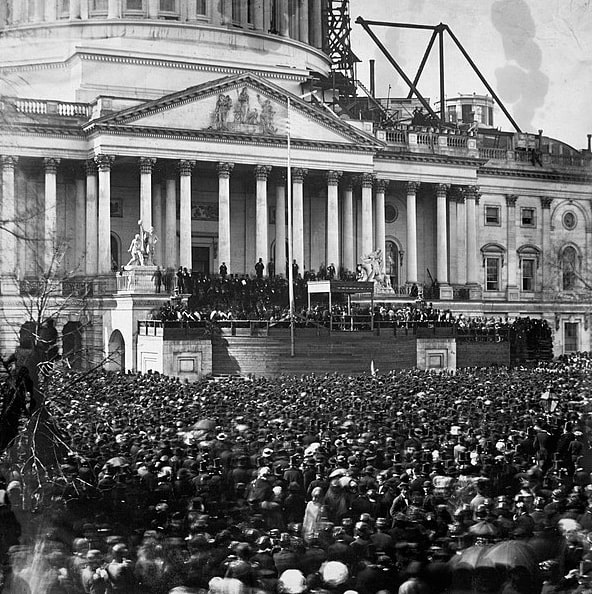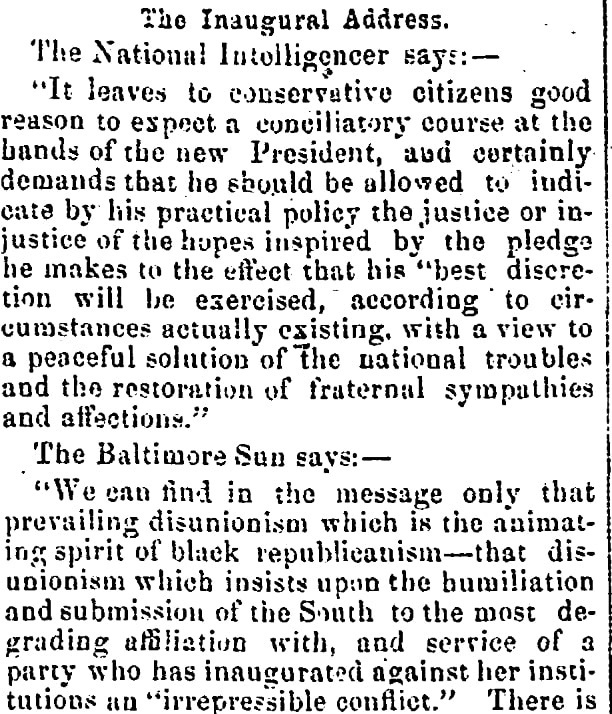Has any president faced a more difficult task than Abraham Lincoln when he rose on 4 March 1861 to deliver his inaugural address? Seven slave states had already seceded from the Union, formed their own country, adopted a constitution, elected a president, and – on the very day of Lincoln’s inauguration – hoisted their newly-adopted Confederate flag over their capital in Montgomery, Alabama. Eight more slave states seemed poised on the brink of secession.
What words could Lincoln possibly summon to heal this division and avert a civil war?

Lincoln’s tone was conciliatory, but he was direct and firm. He emphatically denounced the doctrine of secession, and made it clear that the U.S. intended to keep all federal property – including Fort Sumter in Charleston Harbor, where the opening shots of the Civil War happened one month later. He also promised that the U.S. would not be the first to attack, but it would forcefully protect itself and its property.
At the end of his speech, Lincoln reached out to the South with these stirring words:
“We are not enemies, but friends. We must not be enemies. Though passion may have strained, it must not break our bonds of affection. The mystic chords of memory, stretching from every battlefield, and patriot grave, to every living heart and hearthstone, all over this broad land, will yet swell the chorus of the Union, when again touched, as surely they will be, by the better angels of our nature.”
There were a variety of reactions to Lincoln’s inaugural address, some approving, others full of condemnation and bitterness. Some of this range can be seen in the following article, printed by a Virginia newspaper (Virginia had not yet seceded, though it would do so the following month), which reprinted comments from a number of newspapers.

Here is a transcription of this article:
The Inaugural Address.
The National Intelligencer says:
“It leaves to conservative citizens good reason to expect a conciliatory course at the hands of the new President, and certainly demands that he should be allowed to indicate by his practical policy the justice or injustice of the hopes inspired by the pledge he makes to the effect that his ‘best discretion will be exercised, according to circumstances actually existing, with a view to a peaceful solution of the national troubles and the restoration of fraternal sympathies and affections.’”
The Baltimore Sun says:
“We can find in the message only that prevailing disunionism which is the animating spirit of black republicanism – that disunionism which insists upon the humiliation and submission of the South to the most degrading affiliation with, and service of, a party who has inaugurated against her institutions an ‘irrepressible conflict.’ There is no Union spirit in the address: it is sectional and mischievous, and studiously withholds any sign of recognition of that equality of the States upon which union can alone be maintained. If it means what it says, it is the knell and requiem of the Union, and the death of hope.”
The Baltimore American says:
“Whatever may be the differences of opinion throughout the country upon the various subjects of which the address treats, it will be very generally received as an honest and outspoken avowal of the policy of the new Administration. It is certain that it furnishes no pretext for disunion that has not existed since the November election.”
The Baltimore Exchange says:
“On a document which denies that the South has any reasonable cause of quarrel with the North, or with the Republican Party – which refers to the Chicago platform and the former speeches of the President as to guarantees or assurances, which ought to be satisfactory to the people of the slave States – and which threatens, in a crisis like this, to coerce the latter into obedience to the Federal Government, extended comment is scarcely necessary. If the partial disruption of the Union bade fair to be final a week ago, the utter destruction of the Republic seems to be inevitable now.”
The Baltimore Clipper says:
“It is firm in the nationality of the sentiments expressed and eminently peace-loving and conservative in its recommendations. We heartily commend it as a genuine Union address, worthy of the fullest approbation of every conservative Union-loving man in the South as well as in the North, and not in any way obnoxious to the ultra, but honest advocates of Southern Rights. If Lincoln’s inaugural is an augury of the character of his administration, the country may be congratulated upon his election to the Presidency.”
The Richmond Whig says:
“We have only time to say that the policy indicated therein towards the seceding States will meet with the stern and unyielding resistance of a united South.”
The Richmond Enquirer says:
“Civil war must now come. Sectional war, declared by Mr. Lincoln, awaits only the signal gun from the insulted Southern Confederacy, to light its horrid fires all along the borders of Virginia. No action of our Convention can now maintain the peace. She must fight!”
The Petersburg Express says, the Inauguration will add immensely to public dissatisfaction North and South.
The New York Herald thinks that the Inaugural shows either that Mr. Lincoln has not made up his mind as to his course, or else desired to keep his intentions to himself.
The World is well pleased with the address as tending to reassure the Border States, and showing that Mr. Lincoln has a firm, independent judgment of his own.
The Tribune believes that the address, showing, as it does, that there is a man at the head of the government, cannot fail to exercise a happy influence on the country.
The Express regrets to say that the Message injures the Union cause everywhere in the Border States, and strengthens Secession in all quarters.
Note: An online collection of newspapers, such as GenealogyBank’s Historical Newspaper Archives, is not only a great way to learn about the lives of your ancestors – the old newspaper articles also help you understand American history and the times your ancestors lived in, and the news they talked about and read in their local papers.
Related Articles:

A very predictable reaction.